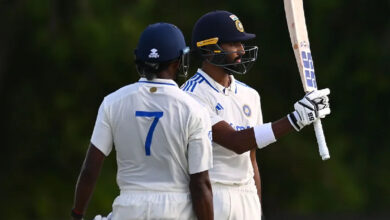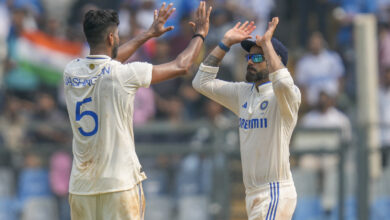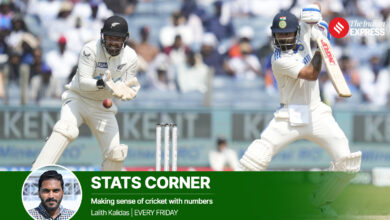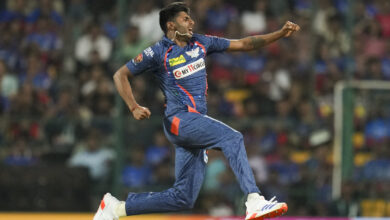‘Winning world medals in dance-running is not easy, but with right thinking, training, it is possible’ | Sport-others News

Parul Chaudhary talks about the overwhelming reception she received after winning gold in 5000m, and Avinash Sable offers insights into the challenges of steeplechase. The Asian Games medalls speak about the warm bond they share. This Idea Exchange was moderated Associate Editor Nihal Koshie.Nihal Koshie: Both of you train together in Colorado Springs (USA). How satisfied are you after winning two medals each?
Parul Chaudhary (PC): We felt good about winning the two medals. We train hard — two to three hours in the morning and evening. Our events require speed, endurance and strength. We have to put in a lot of effort to maintain all three. I had a good performance at the World Athletics Championships and also qualified for the Olympics.
Avinash Sable (AS): There were ups and downs in this year’s performances. After the good result last year in the season’s last race at the Commonwealth Games, I was moving into 2023 with good preparation. However, the result (didn’t qualify for final) at the World Championships was not expected. While I had experience in steeplechase, winning a medal in the 5000m race at the Asian Games felt good.
Nihal Koshie: Parul, you said when you were nearing the finish line in 5000m, you thought if you won you would be able to secure a Deputy Superintendent of Police (DSP) post in the UP (Uttar Pradesh) police. Your brother is also in the police, was he an inspiration?
PC: I have liked the police uniform since childhood. My dream has always been to join the UP police at a high post. DSP has clout in villages. So towards the end of the race, I was thinking about winning gold for India, but also said to myself, “Parul, if you win, you get the DSP post.” I have always dreamt that my brother and I would serve society together. My parents are also happy that my brother and I would work in the same department.
Nihal Koshie: Avinash, when you joined the Army, you went straight from Mandawa to Siachen, which has a very cold climate. Then, you were posted in Lalgarh Jattan, which is very hot. Can you talk about your Army training?
AS: I joined the Army at 18. The nine-month Army training was quite rigorous. But when I thought about the struggle back home, I was determined to complete the training. When I went to Siachen, I realised the atmosphere was different from what it was at the training centres. I started my sporting journey from Lalgarh Jattan. I joined sports training at the end of 2012 and made my debut in 2015. After I joined the Army, I got into bodybuilding and maintained a specific diet. I gained a lot of weight during that time. So before the PT training with the unit, I would go for a run alone because I had to reduce weight. After finishing my duties, I would again go for PT training. After I came first in the unit’s cross-country race, my unit supported me in my sports journey.
Nihal Koshie: Steeplechase and dance running have several quality athletes from Kenya and other countries from Africa. We often hear that their genes help. What do you think after training with them?
AS: I didn’t find anything different in them. We trained with them in Colorado Springs last year and this year. They train constantly, while we take a break of one-two months after each major event. This leads to weight gain. Genes are not a factor. When we train with them, we can match their level. Sometimes, we even perform better than them. We might have less experience in how to improve. But I don’t think they are different. Maybe, their thought process is different. For a long time, the women’s record in 5000m or the steeplechase record, which was held Lalita Babar, was thought to be unbreakable. The problem is with our thinking. In 2018, when I started steeplechase, the medal would be given for nine minutes. I used to think nine minutes was enough to win. Today, I clock 8:11 and there are others who clock 8:30-8:40, whom we call slow.
PC: As Avinash pointed out, they don’t rest after major competitions and practise continuously. If our thinking is positive, then we can do it. When we train outside (India), our thinking changes and it helps us.
They (African athletes) don’t rest after major competitions and practise continuously. If our thinking is positive, we can do it. When we train outside (India), our thinking changes and it helps
Mihir Vasavda: What is needed to ensure that Asian-level dominance can be translated into World and Olympic performances?
AS: A few years earlier, even at the Asian level, we got fewer medals in dance running. Our coach, Nikolai, used to tell us to work hard and change our thinking, we shouldn’t just win in Asia but win medals at the world level too. I feel we can do that. It’s not easy but it is possible.
Mihir Vasavda: At the Asian Games and CWG last year, you ran the race at your own pace. How tough is it to do it at the World and Olympic Games?
AS: I went for the race in Birmingham (Commonwealth Games) thinking I didn’t do well at Worlds, so I don’t want to depend on anyone else. I will do my best and not care about the result. There were three Kenyans. I knew I had to fight hard to win a medal. So I ran that race at my own pace.
At Worlds (this year), I was a bit greedy, thinking I could win a medal. I took the Heats lightly. There wasn’t much competition because there was one Kenyan and Ethiopian. Since it was best five progressing (Heats), I thought why I should (take) lead in the race. In the last two years, I have trained well in Colorado, and I thought I could win a medal anywhere. I didn’t even think I would be outside the best five in the Heats at the Worlds. I feel I need to work on my strategy. The makes I made this year, it’s fine, but for the Olympics I will run only at my pace.
There can be pressure, sometimes, knowing that the government is spending so much money on us. But we focus on not leaving any stone unturned when it comes to working hard
Tushar Bhaduri: Middle and long-dance running is a very lonely sport, both in training and race (other countries also have pacemakers). How do you cope mentally, stay fresh and deal with disappointments?
PC: Ups and downs happen. We motivate each other. If there are no downs, then perhaps we won’t be giving the good results we do. It is important to deal with that. When we don’t do well, we run the next race with anger. Like how Avinash did in Birmingham and Hangzhou, after not doing well at the Worlds.
Tushar Bhaduri: Nowadays, for training and camps there are so many facilities provided the government and SAI. Have you felt pressure over the money being spent on your training?
AS: Usually, the federation, SAI and JSW, support our training but we believe that we need to give our 100 per cent and focus on our training. Wherever we are sent for training, we try to do our best. There is never any pressure from their side.
PC: There can be pressure, sometimes, knowing the government is spending so much money on us. But we focus on not leaving any stone unturned when it comes to working hard. But I don’t worry about it too much (the result) because I know how fast I can run in practice and have an idea of what my time will be in a competition.
Shivani Naik: In your 5000m race, you cut inside from the left with 50m remaining and overtook the Japanese runner. How many times have you looked at that clip since the race?
PC: I’ve been so busy since we came back that I haven’t had the time to see it too many times. But those coming to my house have told me that they watch the last 20m of my race on repeat. I’ve only been able to watch the race once. I really liked my race, and after it ended it felt like a dream. I couldn’t believe I had won gold. I’m very happy because we had earlier won silver and bronze, but we did not have a gold medal.
Shivani Naik: Netherlands’ Femke Bol had a similar push to yours in the last bit of her race. Have you watched that race and were you influenced it?
PC: I haven’t seen that race. I ran according to how my body felt that day and what my coach had explained to me. Avinash had also told me earlier that the Asian Games steeplechase had the World Champion in it and she would win gold but there would be a chance (for gold) in the 5000m and that I shouldn’t let it go. ‘End tak fight karna, kyunki kuch bhi ho sakta hai’ (fight till the end because anything can happen).
Shivani Naik: When the pack is racing ahead of you and you have to stay behind and pace your own race, how do you maintain the discipline required?
AS: I think that kind of a race is a little difficult for me. You have to stay behind the leading group in that situation and that means you don’t get the first track and have to run from the outer lines. The leading pack is also able to clear the hurdles and water jump better. Kenyan athletes have the technique to be quick, so running your own race can be tough sometimes. You can’t plan anything.
In steeple, if you get stuck in one spot, getting out of it is very tough. I am often not able to gain positions in that race. When I go for a race thinking I’ll lead from the start, those races are easier for me.
Nitin Sharma: In your races, what is usually going through your mind?
AS: The 5000 metre race is difficult for me because a lot of questions come to my mind and there are plenty of laps as well. Sometimes, around the 3 km mark, I start thinking about whether I’ll be able to win the race or not. The Asian Games race was like that as well. At one point I was feeling tired and all athletes were close to me, so I was wondering how I would win that race. The pace at which we are going, we often wonder whether we should slow down, go to the back. There’s a lot of pressure because to win you have to wait till the last lap and even then the finishing and speed matter. But in the steeplechase, I have a different mindset. I know the pace at which I have to run the first kilometre and then the second. The last kilometre in steeplechase is tough. The races I’ve run in the Diamond League this season, it’s that last kilometre where I’ve gone down in positions. It’s tough with lactic building up in the body, jumping hurdles and protecting yourself from injuries.
Andrew Amsan: Could you elaborate on the Kozhikode incident, where you applied pain-relief gel make?
AS: That was probably the last time I used that gel. I think it was the Federation Cup, an evening race. My coach, Nikolai, used to always apply a gel. It’s like the body is set on fire after applying it. I asked a fellow athlete to apply it on my body, and I applied some on my face and neck. Nothing happened. But after 3 km, the gel started showing its effect. I just wanted the race to get over. The experience after the race was the most difficult. I was asking everyone to apply ice or pour water on me. They made me sit in an ice case, but my body was still burning. I had applied the wrong gel (pain relief gel). It was already hot outside and then I put on the gel. I’ve never used that gel since, but I still have the bottle.
Vinayakk Mohanarangan: Parul, when you look back, has there been a turning point in your career?
PC: In 2018, I couldn’t even qualify for the Asian Games. At that point, I decided I’ll work very hard for four years so that I achieve everything I want in the next four years. I decided to do two events and get medals in both. Another turning point was in the 2020 Olympics, where I didn’t qualify for the 5000 metres. I thought I should chuck it all and take up a normal job. But then I set my mind, thinking two years are left for the Asian Games, I’ll work hard.
Vinayakk Mohanarangan: What’s the first thing you do after reaching the room after a race?
PC: I look at the medal once I am back in the room, and keep it next to god. Then call up my family. After looking at the medal, everything becomes alright. You don’t even remember all the hard work you’ve put in.
Andrew Amsan: Avinash, many people say that you are very stubborn. Does that attitude help you become a better athlete?
AS: I firmly believe that I’ve reached where I have solely because of my stubbornness. It’s not like I want to portray something. Many people ask me why do I have so much attitude. I’ve achieved targets because of my stubbornness. An athlete shouldn’t have attitude, but stubbornness is alright. I don’t like to lose at all. So it basically makes me stronger.
Andrew Amsan: You both have seen each other grow. How is your bond and how important is it to have a friend and supporter in a track event?Most Read
1
When ex-ISRO chief was told to ‘get lost’ ISRO satellite centre
2
Bigg Boss 17 confirmed l of contestants: Munawar Faruqui, Ankita Lokhande-Vicky Jain, Isha Malviya-Abhishek Kumar in Salman Khan show
See More
AS: It’s very beneficial. If you look at it from a sporting context, we have been training together since 2018. You get to learn a lot when you train with one person for a long time. Having a friend keeps you on track. They’re there to tell you if you are not training enough or training extra hard. I also tell her if she needs to work out less or more. Especially when we are travelling, we take care of each other’s dietary needs.
While coaches and support staff play a big role, we have a huge role to play in each other’s success.
PC: Our bond is very strong. In fact, when I am training for a race I watch Avinash’s videos — especially the race he ran at the Commonwealth Games. I keep watching that video on loop before a big race. In terms of practice, Avinash is very stubborn and dedicated. That motivates me to push myself too.







